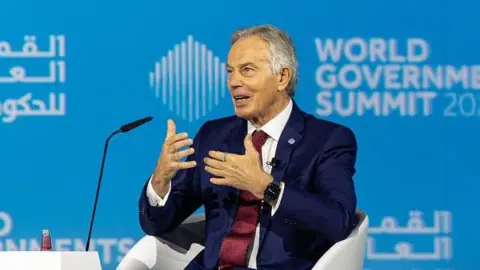The recent discourse surrounding the United Kingdom’s net-zero policies has ignited significant controversy, especially following remarks made by Sir Tony Blair. The former Labour prime minister criticized current efforts to limit fossil fuels, asserting that such initiatives were “doomed to fail” without a comprehensive reevaluation of the strategies being employed. His comments have sparked a debate not only about the practical implications of net-zero strategies but also about the evolving landscape of climate policy and political attitudes toward environmental action in the UK.
In his statements, Sir Tony Blair emphasized that the current narrative surrounding climate change has turned “irrational.” He contended that affluent citizens in developed nations, particularly those in the UK, are reluctant to make costly sacrifices in the face of evidence suggesting their individual contributions to global emissions are minimal. His insights have seized the attention of opposition parties, with an explicit targeting of Labour leader Sir Keir Starmer’s ambition to achieve net-zero carbon emissions in the UK by the year 2050.
In defense of their position, Labour ministers have countered these criticisms by asserting that their path towards net-zero will not necessitate significant financial sacrifices on the part of ordinary citizens. They emphasize a commitment to ensuring that the transition to a greener economy will minimally disrupt everyday life. Environment Secretary Steve Reed, addressing the media, acknowledged the validity of some points made by Blair while maintaining that the current government strategy is ultimately beneficial for Britain, especially concerning energy independence and security.
In support of its net-zero goals, the Labour government has laid out plans to replace a substantial majority of fossil fuels in electricity generation with renewable sources like wind, solar, and wave energy by 2030. This initiative, as highlighted by Reed, is designed not only to foster energy security but also to lessen the UK’s reliance on authoritarian regimes, notably referencing leaders like Vladimir Putin of Russia.
Adding to this heated dialogue, a report by the Climate Change Committee has drawn attention to the lack of substantial progress the Labour government has made in preparing for the adverse impacts of rising global temperatures since taking office. This criticism comes amidst Blair’s call for a reevaluation of the current approach to net-zero targets, suggesting that a focus on emerging technologies, such as carbon capture and storage, would yield more effective results in reducing emissions. He proposes that international efforts should involve engaging major economies, specifically those of China and India, in reducing their emissions rather than solely concentrating on domestic strategies.
The political landscape is further complicated by the reactions from within the Conservative Party. Shadow Environment Secretary Victoria Atkins remarked that Blair’s commentary signaled a necessary reconsideration of the government’s net-zero approach. Echoing this sentiment, new Conservative leader Kemi Badenoch has distanced her party from previously established commitments regarding net-zero by 2050. Atkins champions the idea of a balanced approach that garners public support while highlighting environmental concerns.
However, Blair’s intervention has not been without criticism from various factions. Critics within the Labour Party accuse him of lending support to opposition parties, including the Conservatives and Reform UK, by undermining the challenges posed by net-zero implementation. Some insiders view Blair’s timing and public stance as indicative of a waning influence over the aspirations of Labour leader Sir Keir Starmer, particularly in light of an impending local election.
This ongoing discourse underlines the tensions within the Labour Party regarding climate policies as factions seek to balance economic interests, environmental urgency, and public sentiment. As the debate unfolds, it becomes evident that while there is a collective recognition of the need to address climate change, the methods and strategies to achieve this goal remain fiercely contested across the political spectrum in the UK. The coming months could prove pivotal as Labour navigates its path forward in the realm of environmental policy, aiming to present a united front while responding to mounting critiques from all sides.



